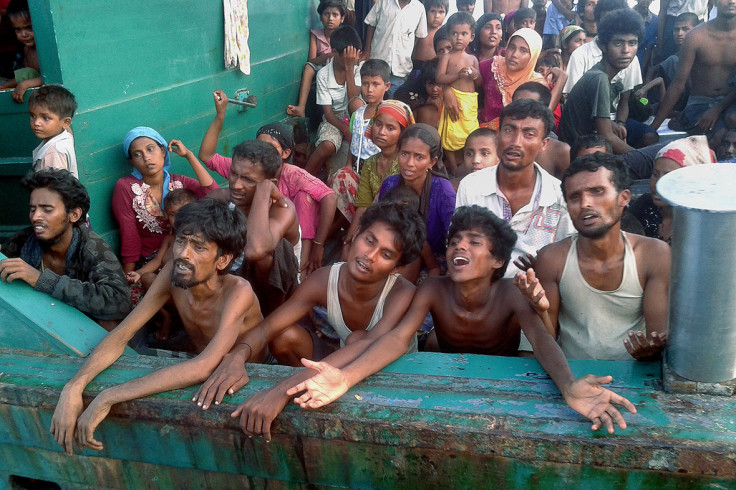Southeast Asian migrant crisis: 'Ghost ship' carrying 350 starving Rohingya Muslims vanishes off Thailand

The wooden fishing boat carrying 300 Rohingya men, women and children has gone missing in the waters between Thailand, Malaysia and Indonesia after more than 60 hours without contact.
The wooden fishing boat, packed with refugees, was spotted adrift in the Andaman Sea after it was turned away by Malaysian authorities. The boat's captain and crew abandoned them without food and water. Thai authorities said they had repaired the engine and provided basic food, water and medicine before towing the vessel into international waters towards the Indonesian Aceh province.
But it has now not been seen for three days.
"It just vanished, which is really worrying," Chris Lewa of The Arakan Project, a Rohingya rights group, told IBTimes UK. "It never made it Aceh. We know that they have food for just two or three days and there were already fights over the food when we last heard of them, on Saturday at 9pm.
"Men were trying to get all the water and not giving that to the women. It's a horrible situation," Lewa added.
Thai authorities insisted that the refugees on the trawler "did not want to come to Thailand" but travel on to Malaysia instead. The local spokesman for the International Organization for Migration (IOM) Jeff Labovitz told IBTimes UK that contrary to the official government line, local Thai authorities offered disembarkation. Officially they say they are going to push them back, but luckily when the migrants are in humanitarian need, they offer them supplies and even to land in Thai shores. That's good news," he said.
Thai navy intimidation
However, Lewa told a different story. She maintains that the Thai minister of defence never issued a disembarking order for the boat and refugees were intimidated by the Thai navy to go out of the country's territorial waters "or they would shoot at them".
The stricken vessel has became emblematic of a the emerging south east Asian migrant crisis after international reporters, including Thomas Fuller of the New York Times, approached the vessel in the Andaman Sea. According to reports, Rohingya pleaded desperately crying: "Please help us! I have no water! Please give me water!". Pictures showed Rohingya jumping overboard to collect food supplies dropped by a Thai army helicopter into the Andaman sea.
There are also reports that human brokers aboard the stricken vessel refused to disembark in Thailand for fear of being arrested following the recent crackdown on smugglers. "Passengers wanted to disembark but the smugglers didn't," said Lewa, who cited reports from the boat. "The boat is controlled by brokers who didn't want to Thailand."
Nearly 3,000 migrants have been brought ashore or rescued off the coasts of Indonesia, Malaysia and Thailand. Aid workers have warned that up to 8,000 more migrants may be stranded in the Andaman Sea with nowhere to go and limited supplies of water and food.
Regional governments of Indonesia, Malaysia and Thailand have refused to engage in search-and-rescue operations, instead repulsing the boats back to sea.
Phil Robertson of Human Rights Watch Asia accused the Thai, Malaysian and Indonesian navies of "playing a three-way game of human ping pong".
The UN has warned of a "massive humanitarian crisis" looming on the Rohingya migrants because no government is willing to accept the migrants.
Aid organisations such as the UN refugee agency, the International Organization for Migration (IOM) and others have urged the leaders of Indonesia, Malaysia and Thailand "to protect migrants and refugees stranded on vessels in the Bay of Bengal and the Andaman Sea, to facilitate safe disembarkation, and to give priority to saving lives, protecting rights, and respecting human dignity".
© Copyright IBTimes 2025. All rights reserved.




















